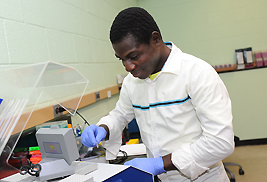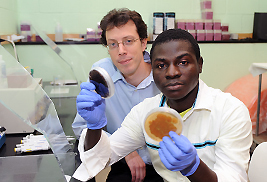Featured Article
Scholar Conducts Research at Kent State to Enhance Food Security in West Africa
Nigerian scholar Moses Abiala is conducting research at Kent State University on molecular identification of soil microorganisms that can help develop indigenous biological fertilizer to enhance the growth of corn and other major cereal crops in West Africa.
read moreScholar Conducts Research at Kent State to Enhance Food Security in West Africa
Posted Oct. 10, 2011 | Foluke Omosun Moses Abiala is on a two-month fellowship at Kent State
Moses Abiala is on a two-month fellowship at Kent Stateto find safer alternatives to chemical fertilizers and
pesticides. Abiala's research at Kent State can potentially
boost food security in West Africa.
Nigerian scholar Moses Abiala is conducting research at Kent State University on molecular identification of soil microorganisms that can help develop indigenous biological fertilizer to enhance the growth of corn and other major cereal crops in West Africa.
Abiala, a doctoral student and research assistant at the University of Ibadan in Nigeria, is on a two-month fellowship at Kent State, funded by the West African Research Association (WARA). WARA collaborates with universities like Kent State to promote research and scholarly exchange between West African and U.S. scholars and institutions.
Under the direction of Kent State Associate Professor of Biological Sciences Christopher Blackwood, Ph.D., Abiala is working to find alternatives to NPK chemical fertilizers and pesticides that can boost food security and enhance the nutrition in corn and other crops that are staple foods in the West African region.
According to Abiala, the drive for farmers in his country to produce more food sometimes leads them to overuse chemical fertilizers and pesticides that result in the contamination of the soil and water, which causes disease and death. That practice prompted him to look into safer alternatives that guarantee increased food production and also support the United Nations Millennium Development goal to end hunger and extreme poverty.
“Most of my research work has been done in Nigeria,” says Abiala. “My work in the United States is basically to identify the molecular makeup of this bio-fertilizer alternative to chemical fertilizers before introducing them to the farmers back home.”
Abiala’s research at Kent State will help him investigate the identity, genetic relatedness and diversity of the soil microorganism, phyto-beneficial actinomycetes, across the ecological zones in Nigeria.
“The soil bacteria, actinomycetes, have the potential to enhance growth of major food crops in Nigeria, but they have not been previously studied in this region,” says Abiala. “Dr. Blackwood’s laboratory has all the research facilities that I need for my research work and he has helped me work through my research challenges, which makes me optimistic about my findings.”
Abiala will present the results of his research at international conferences and in scientific journals and will share the expertise he gains at Kent State with his colleagues back in Nigeria.
“Moses's research is a great demonstration of homegrown solutions to African problems,” says Blackwood. “Indigenous soil microorganisms are likely to be our best bet to developing a sustainable alternative to fertilizers and pesticides for use in Africa.”
Blackwood says, even though the work originated with Abiala in Nigeria, Kent State has the resources and expertise to help propel the research.
“Although Moses was able to use classical microbiological techniques in Nigeria, genetic sequence information that he is obtaining here at Kent State is important because it will allow us to draw on scientific knowledge accumulated on many other microorganisms,” says Blackwood. “This context will provide many clues to the life of the microorganism in the soil, including why it has beneficial properties and how we can maximize its use.”
Kent State Associate Professor Wendy Wilson-Fall, Ph.D., chair of the Department of Pan-African Studies and secretary of the WARA board, says the scholar-in-residence opportunity helps scholars from West Africa learn more about how things work in other countries, particularly the industrial west.
“It affords scholars a chance to access resources that we use regularly in the United States,” says Wilson-Fall. “It also provides an important opportunity for exchange between American and West African researchers for the sharing of ideas, research problems and research results.”
Wilson-Fall who is also a former director of the West African Research Center, WARA’s overseas center in Senegal, Africa, says as an institutional member of WARA, Kent State’s Department of Pan-African Studies’ collaboration with the research organization is an excellent partnership that is beneficial to several other departments at Kent State.
“WARA supports linkages between American and West African scholars and also helps each group of scholars become more aware of, and more familiar with, research and higher education institutions in both North America and West Africa,” she says.
For more information about Abiala’s research work at Kent State, contact Blackwood at cblackwo@kent.edu. For more information about WARA, contact Wilson-Fall at wwilson1@kent.edu or visit www.bu.edu/wara/.
